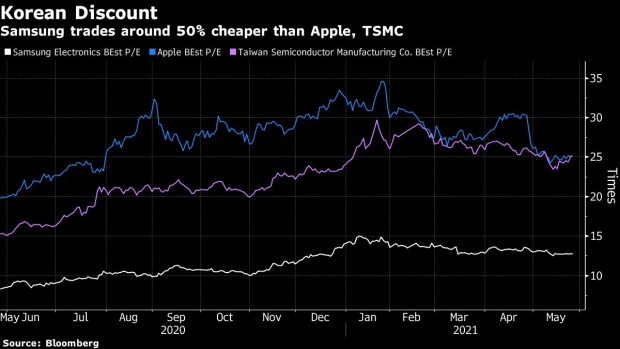May 26, 2021
Samsung Still a Bargain in Red Hot Korea Market, Hedge Fund Says
, Bloomberg News

(Bloomberg) -- While a flood of retail investing in growth sectors has pushed South Korean stocks to record highs, one hedge fund says there’s still value to be found in the country’s conglomerates.
Heavy individual-investor buying of shares in niche sectors such as electric vehicles and biotechnology helped the Kospi index climb 56% over the past year, making it the world’s sixth-best performing benchmark. Yet Samsung Electronics Co.’s forward earnings multiple is only about half that of Apple Inc., while Hyundai Motor Co. trades at 64% of book value.
“An interesting thing about the Korean market is that in certain pockets, it can be very hot, but in some other parts, it can also be extremely cheap,” James Lim, a California-based senior research analyst Dalton Investments LLC, said in an interview.
The $3.2 billion hedge fund bought shares of some of the country’s family-owned conglomerates, or chaebol, when their prices declined during the first quarter, Lim said, declining to specify exactly which stocks. Dalton is “generally positive” on Samsung, Hyundai, SK Inc. and LG Corp., he said.
His remarks come as investors have begun to wonder if Korean stocks have risen too much, too quickly. Despite trading sideways over the past month amid the partial lifting of a ban on short-selling and global concern over inflation, the Kospi has more than doubled from its pandemic low.
That’s helped push the gap between fundamentals and valuations for chaebol stocks to “one of the historically widest levels,” Lim said. While holding companies tend to trade at lower valuations than their higher-profile operating units, shares of South Korea’s business groups have additionally suffered over the years from concerns about weak corporate governance and low shareholder returns.
“Compared to their net asset value or estimated real net asset value, the discount can be easily 50% to 70%,” the analyst said “That’s something you don’t see frequently in other markets.”
Lim said that the situation is improving, with the big four groups increasingly aligning management and shareholder interests. They have also begun to make share-price performance one of the key criteria for measuring management performance.
‘Longer-Term Story’
SK Inc. aims to boost its market value by sevenfold to 140 trillion won ($125 billion) by 2025, its chief executive said at the annual shareholder meeting in March. Shares of the holding company are up 12% so far this year, outperforming the 3.8% increase in chipmaker unit SK Hynix Inc., but lagging the 44% and 34% gains at EV-battery supplier SK Innovation Co. and mobile carrier SK Telecom Co.
Shares of LG Corp. have jumped 45% this year, fueled by its plan to split off some slower-growth businesses to focus on its high-tech holdings, including LG Electronics Inc. and LG Chem Ltd. The holding company resumes trading Thursday following a monthlong halt amid the reorganization.
While Lim said the chaebol stocks are attractive because the market has yet to price in such reform efforts, he added that it could take investors 3 to 5 years to understand how to properly value them.
“This is more of a longer-term story,” he said, adding that it is “very difficult” to explain the valuation of some Korean holding companies.
©2021 Bloomberg L.P.